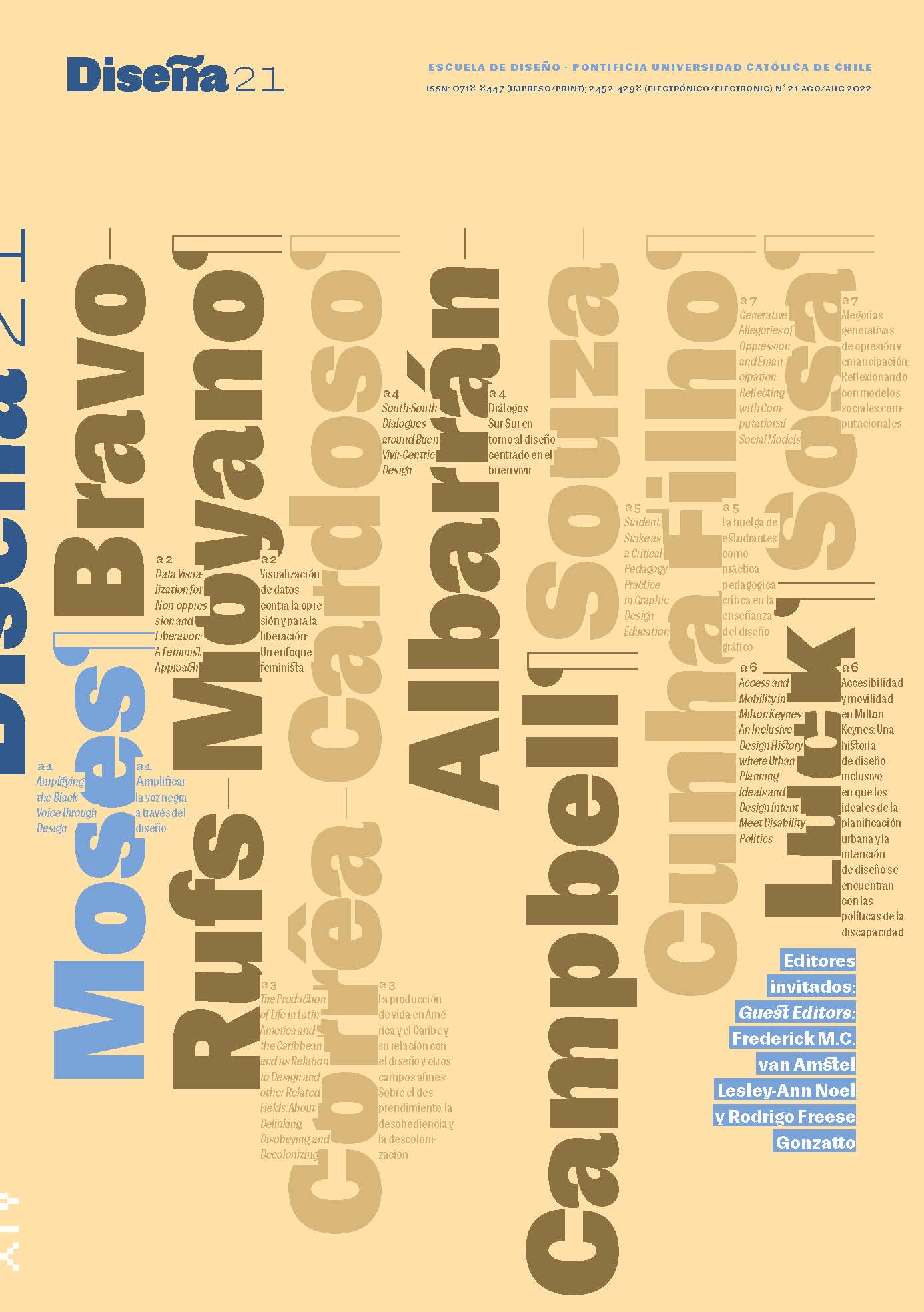Design, Oppression, and Liberation
Main Article Content
Abstract
The role of design in structuring oppression has gone largely unacknowledged by design research and design history. However, we can see a recent move, pushed by social movements, to recognize design’s complicity with many forms of oppression. Acknowledging oppressive design opens up the possibility of occupying, reclaiming, repairing, and restoring what oppressors have done with it. Some approaches shift design research from denouncing to announcing new realities. Without doing so, fatalism could prevail, even if critical of the current reality. In the case of design, this means putting equal effort on analyzing oppressive designs and on developing liberating designs. In tune with this implication, this special issue highlights research that contributes to both sharpening the understanding of oppression in design, and increasing the solidarity between the different struggles for liberation that cut across design.
Downloads
Article Details

This work is licensed under a Creative Commons Attribution-ShareAlike 4.0 International License.

This work is licensed under a Creative Commons Attribution-ShareAlike 4.0 International license.
COPYRIGHT NOTICE
All contents of this electronic edition are distributed under the Creative Commons license of "Attribution-ShareAlike 4.0 Internacional" (CC-BY-SA). Any total or partial reproduction of the material must mention its origin.
The rights of the published images belong to their authors, who grant to Diseña the license for its use. The management of the permits and the authorization of the publication of the images (or of any material) that contains copyright and its consequent rights of reproduction in this publication is the sole responsibility of the authors of the articles.
References
Angelon, R., & van Amstel, F. (2021). Monster Aesthetics as an Expression of Decolonizing the Design Body. Art, Design & Communication in Higher Education, 20(1), 83–102. https://doi.org/10.1386/adch_00031_1
Bardzell, S. (2010). Feminist HCI: Taking Stock and Outlining an Agenda for Design. Proceedings of the SIGCHI Conference on Human Factors in Computing Systems, 1301–1310. https://doi.org/10.1145/1753326.1753521
Costanza-Chock, S. (2018). Design Justice: Towards an Intersectional Feminist Framework for Design Theory and Practice. Proceedings of the Design Research Society 2018. https://papers.ssrn.com/sol3/papers.cfm?abstract_id=3189696
Fanon, F. (2007). The Wretched of the Earth. Grove.
Freire, P. (1984). A máquina está a serviço de quem? Revista BITS, 1(7), 6.
Freire, P. (1996). Pedagogy of the Oppressed. Continuum.
Freire, P. (2000). Pedagogia da indignação. UNESP.
Gonzatto, R. F., & van Amstel, F. (2022). User Oppression in Human-Computer Interaction: A Dialectical-existential Perspective. Aslib Journal of Information Management, (ahead-of-print). https://doi.org/10.1108/AJIM-08-2021-0233
Grosfoguel, R. (2020). Pensamiento descolonial afro-caribeño: Una breve introducción. Tabula Rasa, (35), 11–33. https://doi.org/10.25058/20112742.n35.01
Gutiérrez Borrero, A. (2015). Resurgimientos: Sures como diseños y diseños otros. Nómadas, (43), 113–129.
hooks, bell. (2014). Teaching to Transgress. Routledge.
Jack, M., & Tuli, A. (2021). Designing for Liberation: Our Lives, Mobility, and Technology. Interactions, 28(2), 34–41. https://doi.org/10.1145/3448020
Liao, S., & Huebner, B. (2021). Oppressive Things. Philosophy and Phenomenological Research, 103(1), 92–113. https://doi.org/10.1111/phpr.12701
Noel, L.-A. (2020). Envisioning a Pluriversal Design Education. In R. M. Leitão, L.-A. Noel, & L. Murphy (Eds.), Proceedings of PIVOT 2020: Designing a World of Many Centers, DRS Pluriversal Design SIG Conference (pp. 69–77). https://doi.org/10.21606/pluriversal.2020.021
Passos, L. A. (2010). Trama. In D. R. Streck, E. Redin, & J. J. Zitkoski (Eds.), Dicionário Paulo Freire (pp. 406–407). Autêntica Editora.
Reynolds-Cuéllar, P., Grisales, C., Wong-Villacrés, M., Serpa, B., Goñi, J. I., & Lemus, O. A. (2022). Reviews Gone South: A Subversive Experiment on Participatory Design Canons: Dedicated to the Memory of Oscar A. Lemus. Proceedings of the Participatory Design Conference 2022 - Volume 1, 206–217. https://doi.org/10.1145/3536169.3537794
Santos, M. R. dos. (2018). Gênero e cultura material: A dimensão política dos artefatos cotidianos. Revista Estudos Feministas, 26. https://doi.org/10.1590/1806-9584.2018v26n137361
Schultz, T., Abdulla, D., Ansari, A., Canlı, E., Keshavarz, M., Kiem, M., Martins, L. P. de O., & J.S. Vieira de Oliveira, P. (2018). What Is at Stake with Decolonizing Design? A Roundtable. Design and Culture, 10(1), 81–101. https://doi.org/10.1080/17547075.2018.1434368
Souza, O. (2020). Racist Motifs in Design. In R. M. Leitão, L.-A. Noel, & L. Murphy (Eds.), Proceedings of PIVOT 2020: Designing a World of Many Centers, DRS Pluriversal Design SIG Conference. https://doi.org/10.21606/pluriversal.2020.013
van Amstel, F., & Gonzatto, R. F. (2020). The Anthropophagic Studio: Towards a Critical Pedagogy for Interaction Design. Digital Creativity, 31(4), 259–283. https://doi.org/10.1080/14626268.2020.1802295
Vieira Pinto, Á. (1993). Sete lições sobre educação de adultos. Cortez.
Westerlaken, M. (2020). What is the Opposite of Speciesism? On Relational Care Ethics and Illustrating Multi-Species-isms. International Journal of Sociology and Social Policy, 41(3/4), 522–540. https://doi.org/10.1108/IJSSP-09-2019-0176

